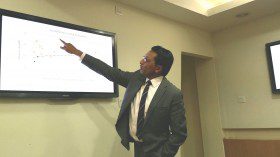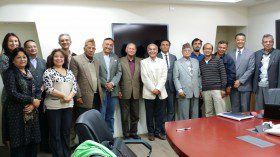
Dr. Swarnim Wagle, Harvard Kennedy School alumnus (MPA/ID 2001) and Member of the National Planning Commission of Nepal, presents on the topic “Igniting Nepal’s Fortunes.”
The Harvard Alumni Group of Nepal held its monthly meeting on the March 10, 2015 in Kathmandu. Dr. Swarnim Wagle, Harvard Kennedy School alumnus (MPA/ID 2001) and Member of the National Planning Commission of Nepal, presented on the topic “Igniting Nepal’s Fortunes.”
Dr. Wagle began his talk by looking at the year 1775 when Prithivi Narayan Shah, the founder of modern Nepal, died. It was also the year George Washington became the Commander-in-Chief of the Continental Army in the United States and Adam Smith published the The Wealth of Nations. Dr. Wagle underscored that there has been a great divergence in economic development since then, and talked about factors that has stalled Nepal’s economic growth over the past 200 years.
Connecting Nepali evidence with the mainstream economics literature, he hypothesized that much of Nepal’s development woes can be attributed to its landlocked location and extractive political and economic institutions.
Nepal’s lackluster performance stands out particularly when contrasted with the achievements of the 13 star economies of the post-WWII period, nine of which are in Asia, as identified by the Growth Commission Report led by Michael Spence. Nepal, simply, has under-invested, according to Dr. Wagle.
Despite growth hovering between 2 and 5 percent over the past fifty years, Nepal has made impressive social gains, dramatically reducing poverty, child and maternal mortality, and under-nourishment. Average life expectancy in Nepal today has passed 70, and many of the country’s non-income indicators of progress compare favorably with those of the leading countries in South Asia.
Moving forward, Dr. Wagle stressed that Nepal needs a set of policy and institutional reforms to encourage private capital investments. To jump on to a trajectory of high and sustained economic growth rate, that would mean at least 7% for a decade. He highlighted the unprecedented breakthroughs in hydro-power generation, which means the country is poised to increase its electricity generation ten-fold in 10 years. This, according to Dr. Wagle, signals a new environment for investment and reconstruction.
Dr. Wagle also talked about the need to integrate Nepal’s economy with India and China to leverage an emerging paradigm of trade and investment through global value chains and production networks, with a resuscitation of manufacturing. He emphasized that Nepal’s core strengths remain in tradable services including tourism, specialized agriculture, and clean energy. However, much of Nepal’s potential can only be unlocked if there is a concerted effort to improve the country’s institutions and undergird those with a system of governance that is much more representative and accountable than the present system.
The talk was followed by a lively discussion. Comments and questions were received by group members Ashok Pandey, Astha Thapa, Ava Darshan Shrestha, Basudev Dahal, Genoveva Hernandez-Uriz, Himalaya Shamsher Rana, Krishna Gyawali, Rajju Dhakal and Sanat Basnet.
Bhojaraj Pokharel, coordinator of Adhoc Committee of the group, moderated the talk and wrapped up the program by thanking Dr Wagle for his brilliant presentation.
The Harvard Alumni Group in Nepal has recently been reactivated. The group’s goal is to serve as an interactive platform for proactive discussions on topical issues of national and global importance, as well as to promote professional networking among the alumni community in Nepal. On April 10, the group will host a talk with Mr. Krishna Gyawali, Member of the Group and former Secretary, Government of Nepal, on “Implementation Issues of Plan and Reforms in Nepal.”
For questions about the group, please contact Bhojraj Pokharel, bhojrajpokharel@yahoo.com.

